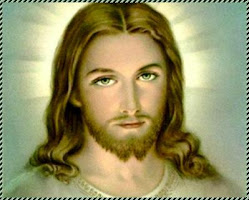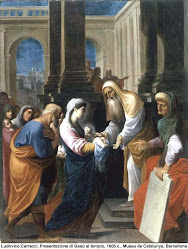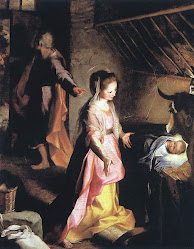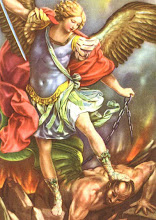The Character of Jesus Christ
The surpassing eminence of the character of Jesus has been acknowledged by men of the most varied type:
Kant testifies to His ideal perfection;
Hegel sees in Him the union of the human and the Divine;
Spinoza speaks of Him as the truest symbol of heavenly wisdom;
the beauty and grandeur of His life overawe Voltaire;
Napoleon I, at St. Helena, felt convinced that "Between him [Jesus] and whoever else in the world there is no possible term of comparison" (Montholon, "Récit de la Captivité de l'Empereur Napoléon").
Rousseau testifies: "If the life and death of Socrates are those of a sage, the life and death of Jesus are those of a god."
Strauss acknowledges: "He is the highest object we can possibly imagine with respect to religion, the being without whose presence in the mind perfect piety is impossible".
To Renan "The Christ of the Gospels is the most beautiful incarnation of God in the most beautiful of forms. His beauty is eternal; his reign will never end."
John Stuart Mill spoke of Jesus as "a man charged with a special, express, and unique commission from God to lead mankind to truth and virtue".
These views by show the impression made on the most different classes of men by the history of Christ.
Jesus in Relation to Men
In His relation to men Jesus manifested certain qualities which were perceived by all, being subject to the light of reason; but other qualities were reserved for those who viewed Him in the light of faith. Both deserve a brief study.
(1) In the Light of Reason
It is true that at first sight the conduct of Jesus is so many-sided that His character seems to elude all description. Command and sympathy, power and charm, authority and affection, cheerfulness and gravity, are the some of the qualities that make the analysis impossible. No wonder then the various investigators have arrived at entirely different conclusion at the study of Jesus. Some call Him a fanatic, others make Him a socialist, others again an anarchist, while many call Him a dreamer, a mystic, an Essene.
(a) Strength
Considering the life of Jesus in the light of reason, His strength, His poise, and His grace are His most characteristic qualities. His strength shows itself in His manner of life, His decision, His authority. In His rugged, nomadic, homeless life there is no room for weakness or sentimentality. Indecision is rejected by Jesus on several occasions;
"No man can serve two masters"; "He that is not with me, is against me"; Seek first the kingdom of God"
These are some of the statements expressing Christ's attitude to indecision of will. Of Himself He said: "My meat is to do the will of him that sent me"; "I seek not my own will, but the will of him that sent me." The authority of the Master does not allow its power to be questioned; He calls to men in their boats, in their tax-booths, on their homes, "Follow me", and they look up into His face and obey.
St. Mathew testifies, "The multitude ...glorified God that gave such power to men"; St. Mark adds, "the kingdom of God comes to power"; St. Luke says, "Thou hast given him power over all flesh"; the Book of the Acts reads, "God anointed him...with power"; St. Paul too is impressed with "the power of our Lord Jesus". In His teaching Jesus does not argue, or prove, or threaten, like the Phrarisees, but He speaks like one having authority. Nowhere is Jesus merely a long-faced ascetic or a joyous comrade, we find Him everywhere to be leader of men.
(b) Poise
It may be said that the strength of Christ's character gives rise to another quality which we may call poise. Reason is like the sails of the boat, the will is its rudder, and the feelings are the waves thrown upon either side of the ship as it passes through the waters. The will-power of Jesus is strong enough to keep a perfect equilibrium between His feelings and His reason; His body is the perfect instrument in the performance of His duty; His emotions are wholly subservient to the Will of His Father; it is the call of complying with His higher duties that prevents His austerity from becoming excessive. There is therefore a perfect balance or equilibrium in Jesus between the life of His body, of His mind, and of His emotions.
This poise in the character of Jesus produces a simplicity which pervades every one of His actions. The life of Jesus flow quietly onward in accordance with the call of duty, in spite of pleasure or pain, honour or ignominy. Another trait in Jesus which may be considered as flowing from the poise of His character is His unalterable peace, a peace which may be ruffled but cannot be destroyed either by His inward feelings or outward encounters.
(c) Grace
Even saints are at times bad neighbours; we may like them, but sometimes we like them only at a distance. The character of Christ carries with it the trait of grace, doing away with all harshness and want of amiability. Grace is the unconstrained expression of the self-forgetting and kindly mind. It is a beautiful way of doing the right thing, in the right way, at the right time, therefore opens all hearts to its possessor.
Sympathy is the widst channel through which grace flows, and the abundance of the stream testifies to the reserve of grace. Now Jesus sympathizes with all classes, with the rich and the poor, the learned and the ignorant, the happy and the sad; He moves with the same sense of familiarity among all classes of society.
For the self-righteous Pharisees He has only the words, "Woe to you, hypocrites"; he disciples, "Unless you become as little children, you shall not enter into the kingdom of heaven." Jesus treats the publicans as His friends; He encourages the most tentative beginnings of moral growth. He chooses common fishermen for the corner stones of His kingdom, and by His kindliness trains them to become the light of the world and the salt of the earth; He bends down to St. Peter whose character was a heap of sand rather than a solid "foundation, but He graciously forms Peter into the rock upon which to build his Church. After two of the Apostles had fallen, Jesus was gracious to both, though He saved only one, while the other destroyed himself.
Women in need are not excluded from the general graciousness of Jesus; He receives the homage of the sinful woman, He consoles the sorrowing sisters Martha and Mary, He cures the mother-in -law of St. Peter and restores the health of numerous other women of Galilee, He has words of sympathy for the women of Jerusalem who bewailed His sufferings, He was subject to His mother till He reached man's estate, and when dying on the Cross commanded her to the care of His beloved disciple.
(2) In the Light of Faith
In the light of faith the life of Jesus is an uninterrupted series of acts of love for man. It was love that impelled the Son of God to take on human nature, though He did so with the full consent of His Father;
"For God so loved the world, as to give his only begotten Son" (John, iii, 16).
For thirty years Jesus shows His love by a life of poverty, labour, and hardship in the fulfillment of the duties of a common trademan. When His public ministry began, He simply spent Himself for the good of His neighbour, "doing good, and healing" (Acts, x, 38).
He shows a boundless compassion for all the infirmities of the body; He uses His miraculous power to heal the sick, to free the possessed, to resuscitate the dead.
The moral weaknesses of man move His heart still more effectively; the woman at Jacob's well, Mathew the publican, Mary Magdalen the public sinner, Zacheus the unjust administrator, are only a few instances of sinners who received encouragement from the lips of Jesus.
He is ready with forgiveness for all; the parable of the Prodigal Son illustrates His love for the sinner. His bitterest enemies are not excluded from the manifestations of His love; even while He is being crucified He prays for their pardon.
" Come to me, all you that labour, and are burdened, and I will refresh you" (Matt., xi, 28)
"Greater love than this no man hath, that a man lay down his life for his friends" (John, xv, 13)
Fulfilling the unconscious prophecy of the godless high-priest, "It is expedient for you that one man should die for the people" (John, xi, 50), He freely meets His sufferings which He could have easily avoided (Matt., xxvi, 53), undergoes the greatest insults and ignominies, passes through the most severe bodily pains, and sheds His blood for men "unto remission of sins" (Matt., xxvi, 28). But the love of Jesus embraced not only the spiritual welfare of men, it extended also to their temporal happiness: "Seek ye therefore first the kingdom of God, and his justice, and all these things shall be added unto you" (Matt., vi, 33).
B. Jesus in Relation to God
Prescinding from the theological discussions which are usually treated in the theses "De Verbo Incarnato", we may consider the relations of Jesus to God under the headings of His sanctity and His Divinity.
(1) Sanctity of Jesus
From a negative point of view, the sanctity of Jesus consists in His unspotted sinlessness. He can defy His enemies by asking, "Which of you shall convince me of sin?" (John, viii, 46). His enemies charge Him with being a Samaritan, and having a devil (John, viii, 48), with being a sinner (John, ix, 24), a blasphemer (Matt., xxvi, 65), a violator of the Sabbath (John, ix, 16), a malefactor (John, xviii, 30), a disturber of the peace (Luke, xxiii, 5), a seducer (Matt., xxvii, 63).
But Pilate finds and declares Jesus innocent, and, when pressed by the enemies of Jesus to condemn Him, he washes his hands and exclaims before the assembled people, "I am innocent of the blood of this just man" (Matt., xxvii, 24). The Jewish authorities practically admit that they cannot prove any wrong against Jesus; they only insist, "We have a law; and according to the law he ought to die, because he made himself the Son of God" (John, xix, 7). The final charge urged against Christ by His bitterest enemies was His claim to be the Son of God.
The positive side of the sanctity of Jesus is well attested by His constant zeal in the service of God. At the age of twelve He asks His mother, "Did you not know, that I must be about my father's business?". He urges on His hearers the true adoration in spirit and in truth (John, iv, 23) required by His Father. Repeatedly He declares His entire dependence on His Father (John, v, 20, 30; etc.); He always thanks His Father for His bounties (Matt., xi, 25; etc.), and in brief behaves throughout as only a most loving son can behave towards his beloved father. During His Passion one of His most intense sorrows is His feeling of abandonment by His Father (Mark, xv, 34), and at the point of death He joyfully surrenders His Soul into the hands of His Father (Luke, xxiii, 46).
(2) Divinity of Jesus
Did Jesus teach that He is God? He certainly claimed to be the Messias (John, iv, 26), to fulfill the Messianic descriptions of the Old Testament (Matt., xi, 3-5; Luke, vii, 22-23; iv, 18-21), to be denoted by the current Messianic names, "king of israel" (Luke, xix, 38; etc), "Son of David" (Matt., ix, 27; etc)
Moreover, Jesus claims to be greater than Abraham (John, viii, 53, 56), than Moses (Matt., xix, 8-9), than Solomon and Jonas (Matt., xii, 41-42); He habitually claims to be sent by God (John, v, 36, 37, 43; etc), calls God His Father (Luke, ii, 49; etc), and He willingly accepts the titles "Master" and "Lord" (John, xiii, 13, 14). He forgives sin in answer to the observation that God alone can forgive sin (Mark, ii, 7, 10; Luke, v, 21, 24; etc).
He acts as the Lord of the Sabbath (Matt., xii, 8; etc), and tells St. Peter that as "Son" He is free from the duty of paying temple-tribute (Matt., xvii, 24, 25). From the beginning of His ministry he allows Nathanael to call Him "Son of God" (John, i, 49); the Apostles (Matt., xiv, 33) and Martha (John, xi, 27) give Him the same title. Twice He approves of Peter who calls Him "the Christ, the Son of God" (John, vi, 70), "Christ, the Son of the living God" (Matt., xvi, 16). Four distinct times does He proclaim Himself the Son of God; to the man born blind (John, x, 30, 36); before the two assemblies of the Jewish Sanhedrin on the night before His death (Matt., xxvi, 63-64; Mark, xiv, 61-62; Luke, xxii, 70).
http://www.newadvent.org/cathen/08382a.htm
http://www.spaceandmotion.com/christianity-christian-jesus-christ.htm
ARTICLES OF THE CHRISTIAN RELIGION
Iscriviti a:
Commenti sul post (Atom)





















Nessun commento:
Posta un commento